| Historiographies of The British Empire |
 |
Historiography of The First British Empire
Authors who argue that the First Empire of the 16th to 18th Century was distinctive from the Second Empire of the 19th and 20th Centuries |
 |
Historiography of The Second British Empire
Authors who discuss the implications and purposes of the Second British Empire of the 19th and 20th Centuries. |
 |
Historiography of The British West Indies and Caribbean
Authors who have charted the history of the British involvement in the Caribbean and the various economic and social models put in place and adapted over a part of the World that the British engaged with for the longest in its imperial history. |
 |
Historiography of The Middle East and The British Empire
Authors who have tracked Britain's growing involvement in a part of the World that they had long passed through but rarely dallied. It was the discovery of oil and strategic concerns for India that saw Britain become ever more involved in the region up until the Second World War before finally succumbing to gradual strategic displacement by the Americans during the Cold War and the period of Decolonisation. |
 |
Historiography of Canada within The British Empire
Authors who have tracked Canada's relationship and development with The British Empire. |
 |
Historiography of Ireland within The British Empire
Authors who have tracked Ireland's relationship and development with The British Empire. |
 |
Historiography of Africa and The British Empire
Authors who have tracked the exploration, exploitation and colonisation of the Pacific Region with regards to The British Empire |
 |
Historiography of the Pacific Region and The British Empire
Authors who have tracked the exploration, exploitation and colonisation of the Pacific Region with regards to The British Empire |
 |
Historiography of Decolonisation and Ending of The British Empire
Authors who have analysed the reasons for the decolonisation process of the 20th Century. |
| Full Colonial Memoirs and Accounts of Imperial Era Life Available to Read |
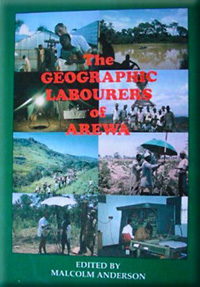 |
The Geographic Labourers Of Arewa: Remembering the Northern Nigerian Survey
Malcolm Anderson has kindly made the PDF version of his book about his life and work in Northern Nigeria available here to download. A review of this book can be read here. |
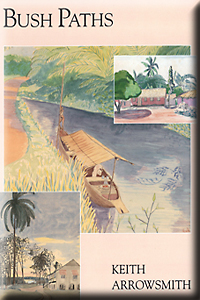 |
Bush Paths
Keith Arrowsmith has kindly given permission for his book about his time living and working in Eastern Nigeria to be made available here He kept a journal of his eight years there which forms the basis of this full and frank account of his time as a colonial administrator. He served in the Rivers, Ogoja and Calabar Provinces where he oversaw administration, law and order and development work for large swathes of the local population. |
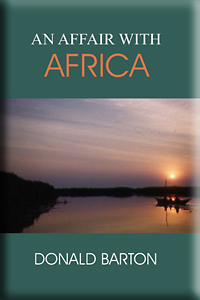 |
An Affair With Africa: Tanganyika Remembered
Don Barton explains the life and responsibilities of a District Officer in the twilight years of the British Empire in Tanganyika. He explains the realities of administrating large swathes of this Eastern African country and the steps undertaken to prepare the country for life after the British left. The author acknowledges the limitations of the administrative framework and the missed opportunities to help embed good practice in post-colonial Tanganyika (or Tanzania as it later became). However he has no regrets about his and his fellow colleagues' earnest attempts to provide opportunities and fair government in one of the poorest colonies in the British Empire.
|
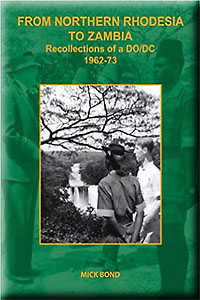 |
From Northern Rhodesia to Zambia: Recollections of a DO/DC 1962-73
Mick Bond gives a full and comprehensive account of his time between 1962 and 1973 as a District Officer and later as District Commissioner. He gives vivid accounts of the daily routine of a colonial officer with all the responsibilities clearly explained. His time coincided not only with Independence but the author was one of those relatively small number of Civil Servants who decided to continue their careers into the post-colonial era into what became Zambia. Mick Bond also played a pivotal role in dealing with the 1964 Lumpa conflict.
|
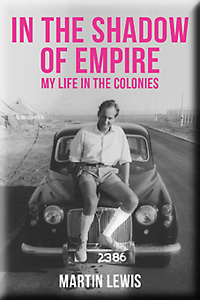 |
In The Shadow of Empire: My Life in the Colonies
Martin Lewis had a remarkably varied career in the ways that the British Empire used to enable as a matter of course even if the permutations and combinations of postings and roles available made each of these careers utterly unique. The author experienced a similar diversity of roles in his own jobs as first a soldier and then a colonial servant. He had a first hand view of some of the key battles of decolonisation in Cyprus, Malaya, Borneo and Aden but also served in very different roles in the Solomon Islands and Hong Kong amongst other postings before retiring to yet another imperially-influenced New Zealand. This account provides an invaluable insight into the sheer variety of opportunities that the British Empire used to offer, even in its years of decline and decolonisation. |
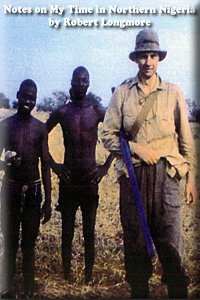 |
Notes on My Time in Northern Nigeria: January 1948 - August 1960
Robert Longmore has written a full account of his time working as a Colonial Officer in Northern Nigeria in the Post-War period right up to Nigerian Independence. He explains the training received when embarking on a career that seemed to have a longer future when he started than actually occurred in reality. He gives an overview of what precisely were the realities of being a District Officer in such isolated postings. He gives prominence to the increasing importance of development issues and how law and order were maintained in a part of the World which often felt more like the Medieval World than the middle of the Twentieth Century. He also tells the role of sport and especially his beloved polo in helping to establish and maintain relationships with the local rulers and elites and allowed him to tour parts of the country that he might otherwise never have seen. His account reminds us of the realities, the limitations of power but also the genuine hopes for the welfare of the people that colonial officers like Robert Longmore ruled over. It is a glimpse on an era that has vanished forever. |
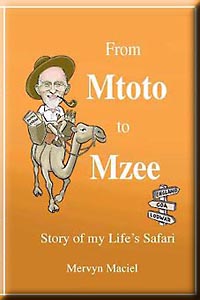 |
From Mtoto to Mzee
Mervyn Maciel has kindly made the PDF version of his book about his life and work in East Africa available here to download. A review of this book can be read here. As the author has donated the profits from this book to the Catholic Mission in Marsabit, Northern Kenya, he very much hopes that readers who access this FREE copy may consider making
a similar donation sending their cheques (made out to 'Consolata Fathers') to:
The Superior, Consolata Fathers, 3 Salisbury Avenue, Finchley,
London N3 3AJ - and please mention "From Mtoto to Mzee" |
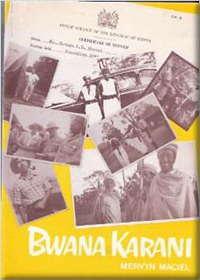 |
Bwana Karani: The Life and Times of Mervyn Maciel in East Africa
Mervyn Maciel gives a full account of what it was like to be a Goan working for the British administration in Kenya and the Northern Frontier District from the late 1940s until early 1960s. He had a front row seat in the days of both the Mau Mau insurrection and the Uhuru march to independence. In addition to his professional experiences, he also relates the joys and the challenges of establishing and then raising a family in East Africa. He held several varied postings but seems to have found a particular attraction to the nomadic peoples and wide open spaces of the Northern Frontier District. |
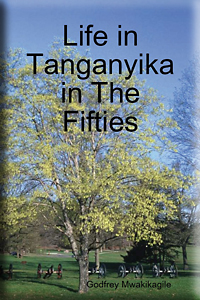 |
Life in Tanganyika in The Fifties
Godfrey Mwakikagile examines the relationships between the British and the Africans in the 1950s in the last days of imperial rule in Tanganyika. What makes this account particularly compelling is that he is an African whose own family experienced life under colonial rule. Interviewing many surviving actors, this book offers compelling primary evidence on the state of race relations at this delicate time before independence. |
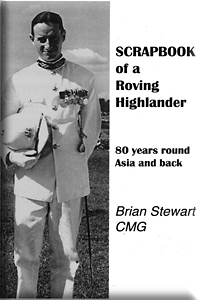 |
Scrapbook of a Roving Highlander: 80 Years Around Asia and back
Brian Stewart's autobiography outlines his career in the military and service in World War Two before deciding that an adventurous life, even if in peacetime, could still be had by turning to the Colonial Service in the post-war period. The author went on to spend much of the rest of his professional life in Asia, particularly in Malaya as it transitioned to independence as Malaysia. However his adventures in Asia did not end with decolonisation but continued into the Foreign and Commonwealth Office with fascinating postings to war time Vietnam, the Philippines and back to colonial Hong Kong. His life and varied career exemplify the kind of global reach that a career in the British Colonial and diplomatic branches could reach even as the tide was receding for Britain's political power in the Post-War period. |
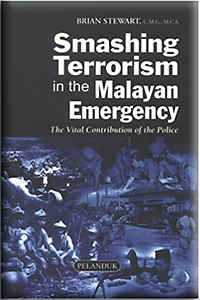 |
Operation Sharp End: Smashing Terrorism in Malaya 1948 - 1958
Edited by Brian Stewart. This series of recollections shows the sheer variety of jobs and situations that members of the Malayan Police had to undertake during the decade of the Malayan Emergency. In many ways the police were more of a paramilitary force with enormous counter-insurgency responsibilities placed upon them. It is also the account of an ultimately highly successful collaboration at all levels although many did indeed pay a high price indeed to keep the Communist threat at bay. |
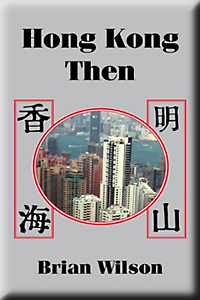 |
Hong Kong Then
Brian Wilson gives his own personal insight into the changing dynamics of the Hong Kong that he grew to know intimately. He saw Hong Kong in its early post-war incarnation having been posted there in 1948. He also witnessed the Fall of next door Nationalist China in 1949 and its replacement by Communist China. Suddenly Hong Kong was propelled onto the front line of the unfolding Cold War. Consequently development was turbocharged and Brian had a front row seat as he saw Hong Kong develop and adapt until he left in 1983. He did return in 1997 and witnessed for himself the handover to China and the end of the era of British oversight. |
| Authors who write Imperial Fiction |
 |
Ian Anderson
The writer of the Scarlet Riders series with the Mounties in Canada. |
 |
John Buchan
The early Twentieth Century writer of adventure and thriller stories - many set in an imperial context. |
 |
Alan Caillou aka Alex Webb aka Alan Lyle-Smythe
This screenwriter, actor and prolific writer had been an intelligence officer and an Imperial Police Commissioner in the 1940s. He drew heavily on these experiences for his fiction and autobiographical writing. |
 |
Robert Carter
From the Spanish Armada to Eighteenth Century India to the Taiping Rebellion - an eclectic collection of imperial related books. |
 |
Joyce Cary
Joyce Cary was a novelist who actually served in the British Empire as an assistant District Officer in Nigeria and so brought his inside knowledge to the stories he wrote. Anthony Kirk-Greene writes about his service and its impact on his writings here |
 |
James Clavell
A writer who specialised in Asia, with novels set in Japan, Singapore and Hong Kong. |
 |
Barbara Cleverly
The writer of crime fiction set in 1920s India |
 |
William Clive aka Ronald Bassett
The creator of Joseph Dando, a British Soldier in the 1850s and 1860s. |
 |
Stuart Cloete
An author who writes about Africa in general and Southern Africa in particular. |
 |
Anthony Conway
An author who had been a major with the Gurkhas for 12 years. His main imperial series of books follows the adventures of Captain John Caspasian, Indian Army officer and defender of the Empire. They are set in the 1920s and 1930s and are set all over the Empire and beyond.
|
 |
James Fenimore Cooper
Famous for his 'Last of the Mohicans' Cooper wrote four more books concerning the character from this novel and wrote many other colonial related books too. |
 |
Bernard Cornwell
Sharpe is better known as a Napoleonic era hero, but in the early days of this character, he saw extensive action in early imperial India! |
 |
Alan Dean Foster
Better known as a Science-Fiction author, Dean Foster turns his attention to New Zealand and the Maori in particular. |
 |
Emma Drummond / Elizabeth Darrell / Eve Dane / Eleanor Drew / Edna Dawes
The writer of historical romances and adventures set in a variety of exotic imperial settings. Edna Dawes was born and raised in Hong Kong as the daughter of a British army officer. She herself spent some time in the military in the Womens Royal Army Corps |
 |
Lawrence Durrell
Lawrence Durrell was an Anglo-Indian cosmopolitan writer who wrote about the difficulties and dislocation of colonists on integrating back with the metropolitan culture. He was an experimental writer who mixed scientific and psychological theories into his works. His most famous work is his tetralogy the Alexandria Quartet |
 |
Dorothy Eden
A New Zealand writer of historical romance usually in a Victorian setting. |
 |
Robert Elegant
An author who writes about the Western influence on Asia and China. He dwells particularly on Shanghai and Hong Kong. |
 |
James Gordon Farrell
The comic author of the Empire Trilogy. |
 |
Amatav Ghosh
An Indian who grew up in Bangladesh, Amatav Ghosh examines the effect of Empire from the bottom up and neatly captures the forces unleashed by this particular brand of globalisation in books like his Ibis Trilogy. |
 |
Rumer Godden
Rumer Godden grew up in India on the banks of the Brahmaputra. She later lived in Calcutta and Kashmir as the Raj moved into its swansong years. She was very evocative at recalling the textures, sights and sounds of the sub-continent especially for the many of her books set in and around India. |
 |
James L Haley
Usually a writer of Texan history, he has also written a remarkable book on the Lions of Tsavo. |
 |
Gerald Hanley
Gerald Hanley's novels reflected his experiences of growing up and living in Africa where he lived in both Kenya and Somalia. He was also influenced by serving in the army in Africa and Burma. He was critical of colonialism was but was also interested in the influence of the British on the wider world. |
 |
M M Kaye
Romance and suspense in Indian and other Imperial settings. |
 |
Rudyard Kipling
Regarded as the bard of India and the Soldier's Friend |
 |
Garry Douglas Kilworth
'Fancy' Jack Crossman is a British soldier who does most of his fighting in the Crimean War. However, after that war he heads towards India on the eve of the Mutiny... |
 |
James Leasor aka Andrew MacAllan
An ex-soldier and journalist who has written on a wide variety of Imperial related fiction and non-fiction books. They are usually but not exclusively set in Asia or the Pacific Rim. |
 |
Doris Lessing
Doris Lessing was born in Persia to suitably imperial parents and was brought up in Rhodesia. Many of her writings focus on the complexities of colonialism and especially in Africa. She was banned from Rhodesia and South Africa due to her outspoken criticism of white settler policies and attitudes to black Africans. |
 |
Allan Mallinson
Allan Mallinson was a Brigadier in the Light Dragoons, as an author he created the Matthew Hervey character of a cavalry officer who serves around the empire just after the end of the Napoleonic War. |
 |
George MacDonald Fraser
This author has taken the bully from Tom Brown's Schooldays and allowed him to mature into a cad and bounder who has adventures all over the Victorian Empire and beyond. |
 |
Philip McCutchan aka Duncan MacNeil
This author has written to sets of books with Imperial themes. One concerns a British soldier (Ogilvie) on the North West Frontier from 1880 to 1900. The other concerns an officer (Halfhyde) in the Royal Navy in the 1890s. |
 |
John Masters
The writer of novels following his semi-fictional Savage family in India. |
 |
Timeri Murari
An author who has resurrected Kipling's famous character Kim and had him grow up in the Imperial Raj. |
 |
Elizabeth Peters
The nineteenth and the early twentieth centurey provides the backdrop for this Anglo-American Archaeologist her family. Murder and mystery abound in the desert and digs under the sun. |
 |
Caryl Phillips
Caryl Phillips is an author of Afro-Caribbean descent who has written extensively on the slave trade and the movement of peoples from Africa to the Caribbean and/or on to Britain. He is particularly interested in the difficulties of and challenges of identification and cultural integration. |
 |
Simon Raven
An ex- and an unconventional soldier who was fascinated by the decline of the upper and officer class at the tail end of empire. |
 |
Douglas Reeman
Known as a nautical writer, he has an interesting series tracking a family of Royal Marines from 1850 to 1982. |
 |
Wilbur Smith
This prolific African writer has set many of his novels in the African continent. |
 |
Paul Scott
A writer who concentrated on the last days of British India. |
 |
Jane Sullivan
A writer on 19th Century Australia and an unusual circus troupe. |
 |
Robert Trevelyan aka Robert Forrest-Webb
The creator of Victorian secret agent John Hawke Trevelyan |
 |
Violet Vivian F Stuart Mann aka William Stuart Long aka V A Stuart
A writer of three series of Imperial era books: Series 1 is about Philip Hazard; a seaman in Crimea and beyond. Series 2 is about Alexander Sheridan; a soldier who gets caught up in the Indian Mutiny. Series 3 is entitled the Austrlians and tracks the history of the colony from the 18th to 20th Centuries. |
 |
Evelyn Waugh
Evenlyn Waugh was a Catholic writer who opined for the decline of aristocracy but in an insightful and often comedic way. He also led something of an interesting imperial life himself which he wrote about in semi-autobiographical novels. |
 |
John Wilcox
A writer who sets his stories of a fictional British officer in the middle to late Victorian period - 1870s to 1880s. He finds himself in many of the crucial battles at the apex of British Imperial ambition. |
 |
Anthologies and Collections
Books which bring together the fiction of a number of authors. |
 |
The District Officer in the African Colonial Novel
Anthony Kirk-Greene examines how Colonial Service in Africa was reflected in literature and how the officers of Empire provided inspiration for this genre of writing. |
 |
For Better or for Verse?
Anthony Kirk-Greene reflects on the quantity and quality of poetry by those who lived and worked in the British Empire. He is interested in how these lines can throw unusual light on the intricacies of daily life for the imperial servants.. |
| Non-Fiction Books offering an Overview of the History of The British Empire |
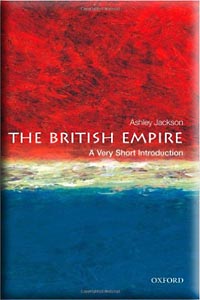 |
The British Empire: A Very Short Introduction
Ashley Jackson has written probably the concisest of the histories of the British Empire. Using just 160 pages to chart nearly five centuries of history is something of an achievement in brevity. It does give you a very useful overview but necessarily lacks the analysis and nuance that other, longer, single volume histories provide.

|
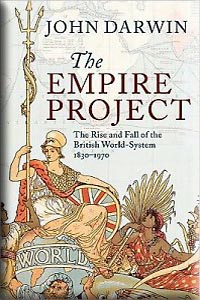 |
The Empire Project: The Rise and Fall of the British World-System, 1830-1970
John Darwin has written a book that claims that the Empire was a varied, in some ways chaotic and very contingent, construction. Nothing like as permanent or as solid as all those bits of the world coloured red would lead you to suggest. It relied upon a quiescent Europe, United States and Asia and it is that, Darwin suggests, which enabled the British to acquire and engage with large parts of the world. But Darwin points out that as soon as Europe became inhabited by aggressive nations and as soon as America became a world power, and as soon as Asia became non-quiescent in the form of Japan and Indian Nationalism then keeping the British show on the road became much harder.

|
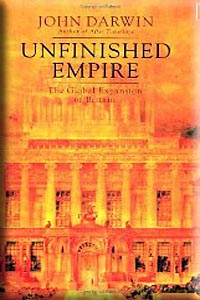 |
Unfinished Empire: The Global Expansion of Britain
John Darwin has followed up his previous books on Empire with an examination of the extension and retraction of British economic and political power. He pays particular attention to the entrepreneurial systems which allowed for the expansion into profitable markets and the Royal Navy which guarded the highways of free trade for so long.

|
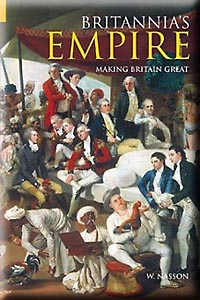 |
Britannia's Empire: Making a British World
Bill Nasson offers a chronological overview of the entire British Empire from its inception to its decline and fall. He also has an excellent chapter on its legacy and impact on the British and the wider world. Very insightful and would make a great introduction to the topic.

|
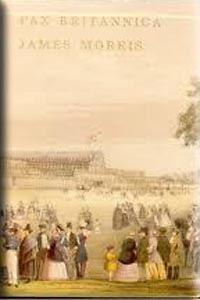 |
Pax Britannica
Jan (or James) Morris has written one of the more elegant sweeps of the imperial story. The style, elegance and organisation of the prose really brings this trilogy to life. Highly recommended for those ready for a bit more substance to their overview of The British Empire.

|
 |
Empire: How Britain Made the Modern World
Niall Ferguson has written an overview of The British Empire that really challenges the perceived wisdom of it being an overwhelmingly anachronistic and negative institution. His thesis believes that it set up the global system of economics that is the norm today in what he refers to as 'Angloglobalisation'. It is a thought-provoking and interesting book that makes you consider the Empire from a fresh angle.

|
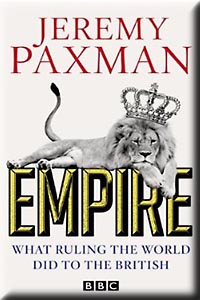 |
Empire: What Ruling the World did to the British
Jeremy Paxman wrote a book to accompany his BBC TV Series. Despite its subtitle, it has a wide approach that hits many of the subtleties of the wider imperial experience. It is thematic rather than chronological, but still covers a lot of ground.

|
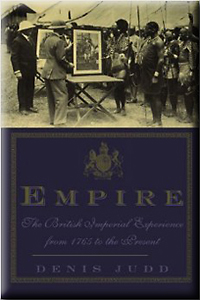 |
Empire: The British Imperial Experience from 1765 to the Present
Dennis Judd has written a thematic overview of the British Empire although placing those themes within a chronological context. It gives a good overview of the political dimensions but does not spend as much time analysing fundamental issues as to the rationale or impact of empire either on the world or Britain itself. What the book does do is give a variety of flavours and issues to ponder and consider.

|
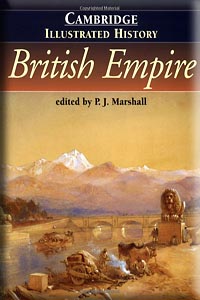 |
The Cambridge Illustrated History of The British Empire
P. J. Marshall has edited a beautifully produced overview of The British Empire on behalf of Cambridge University. It runs thematically, but covers a lot of ground. Good at taking the story to a more nuanced level.

|
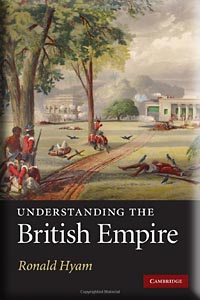 |
Understanding The British Empire
Ronald Hyam has written a thematically based overview of topics that help explain the motivation, extent and consequences of Empire.

|
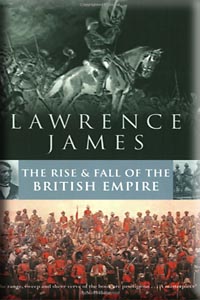 |
The Rise and Fall of The British Empire
Lawrence James has written a sympathetic overview of The British Empire in an approachable format.

|
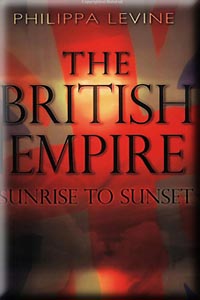 |
The British Empire: Sunrise to Sunset
Phillipa Levine has written a highly critical overview of the imperial experience focussing on the negatives and brutality within the institution.

|
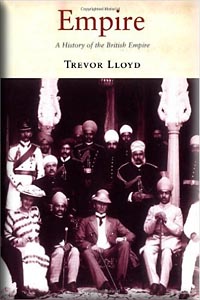 |
Empire: A History of the British Empire
Trevor Lloyd has written a chronological overview of the history of the British Empire focussing on all the main headline events. It is another brief tome at just 224 pages. It gives more brevity to the early centuries than the later stages of empire which is perhaps to be expected. It should be said though that with more attention paid the book becomes progressively more useful and is particularly strong at looking at the period of transition from Empire to Commonwealth and the processes of decolonisation.

|
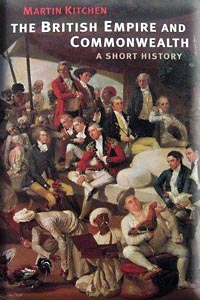 |
The British Empire and Commonwealth
Martin Kitchen has written a 208 page overview which concentrates on the political development and decline of the British Empire. He charts the varied inspirations behind the imperial adventures highlighting the breadth of motivations from monetary gain to moral high-mindedness to strategic cunning to military endeavour and much more besides. His book is of particular value in relating the importance of the Empire to Britain's success in the Nineteenth Century and how the Empire enabled Britain to be ultimately triumphant in the two great wars of the 20th century.

|
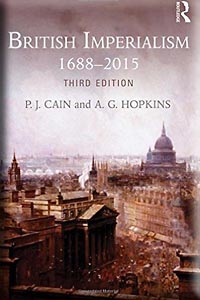 |
British Imperialism 1688 - 2015
P.J. Cain and A.G. Hopkins' book concentrates on the economic imperatives behind the establishment of the Empire, it long years of domination and its ultimate decline. Originally published as two separate volumes: Innovation and Expansion 1618 - 1914 and Crisis and Deconstruction 1914 - 1990, they have now been combined and updated to the present date. This is very much a landmark interpretation of economic imperial history.

|
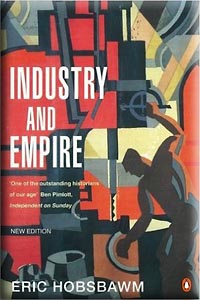 |
Industry and Empire: From 1750 to the Present Day
Eric Hobsbawm's book is another classic economic analysis of the British Empire. He was very much a Marxist historian who believed that there were stages of economic development that the British Empire exhibited and followed along its trajectory in its rise and its ultimate fall.

|
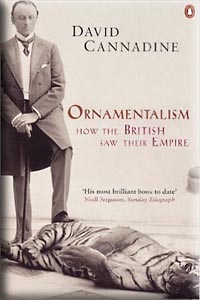 |
Ornamentalism: How the British Saw Their Empire
David Cannadine has taken a different tack. Rather than examining the chronological, political and military developments that led to the acquisition and eventual disposal of Empire, he looks into the inter-relationship between the Empire and British society. In effect he looks at how the class structures and hierarchies played themselves out in the various colonies and how those colonies interacted with Britain's social strata.

|
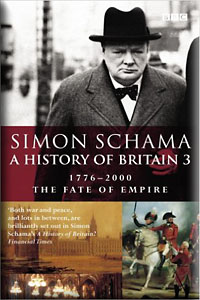 |
A History of Britain: Fate of Empire 1776 - 2001
Simon Schama's third book in his 'History of Britain' series concentrated on how Britain's national character was changed from being one of exporting its views on civilisation to dealing with the consequences of being an imperial power and transforming itself into a multicultural society.

|
| Themes in Imperial History |
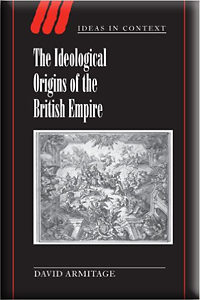 |
The Ideological Origins of the British Empire
David Armitage argues that commercial concerns were ultimately more important than religious or civilising motives in driving the quest for colonies and colonial expansion. He believes that trade and commerce bound together the disparate colonies especially during the early years when political and religious tensions were at there greatest.

|
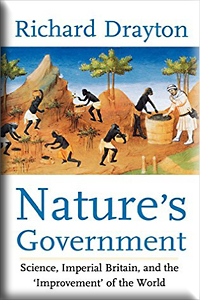 |
Nature's Government: Science, Imperial Britain and the 'Improvement' of the World: Science, British Imperialism and the Improvement of the World
Richard Drayton charts the interconnectedness between scientific breakthroughs and the spread of colonialism as new opportunities and problems led to new advances which further increased Britain's ability to colonise.

|
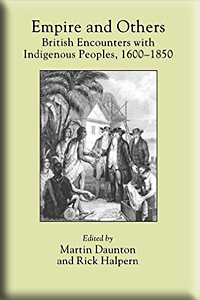 |
Empire and Others: British Encounters with Indigenous Peoples
Martin Daunton and Rick Halpern consider how colonists contacts with foreign and native societies unfolded and how both sides were forced to modify their understanding of each other and ultimately how the process helped redefine identities.

|
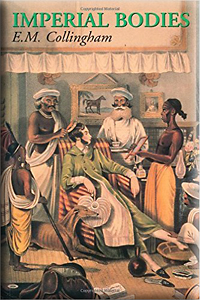 |
Imperial Bodies: The Physical Experience of the Raj, c.1800-1947
E.M. Collingham's book examines how the British experience in India helped redefine the way in which they saw themselves in relation to those they ruled. The British worked hard to cultivate an aura of authority and prestige but this very process ultimately led to their becoming too distanced and isolated from those over whom they ruled.

|
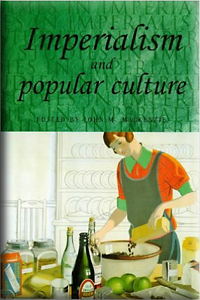 |
Imperialism and Popular Culture
John M. MacKenzie's book gives an overview into the ways the British Empire seeped into the popular culture of the mid to late Empire. It looks at how it was portrayed in literature, film, theatre, advertising and many other media. It goes on to consider just how successful were the attempts to mould positive attitudes towards Empire or whether other influences were greater still. Ultimately, just how important was Empire to the national character?

|
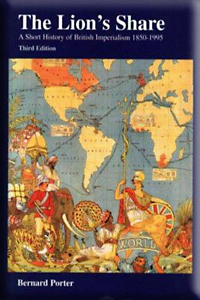 |
The Lion's Share: A Short History of British Imperialism 1850 - 1995
Bernard Porter has written a book that claims that the British Empire was actually something of a mask that covered up and even contributed to weakening the fundamental strength of Britain's economic, political and military base. Basically The book sees Britain's imperialism as a symptom of its decline, rather than of its strength.

|
| Magazines, Journals and Periodicals on Imperial History |
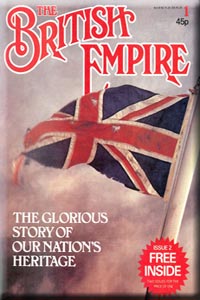 |
British Empire Magazine
Orbis printed 96 weekly editions on The British Empire in the late 1970s. This was itself a reprint of a Time-Life / BBC series from the early 1970s. It was an extremely detailed and wide-ranging series of magazines and well worth trying to locate. You should be able to find them on ebayFor a detailed list of the contents of each issue click here |
 |
The Round Table: The Commonwealth Journal of International Affairs
Established in 1910 by Alfred Milner as Round Table: A Quarterly Review of the Politics of the British Empire, it reflected a pro-imperial agenda by leading politicians and academics of the time. It quickly became embedded to the idea of promoting the idea of a wider 'Commonwealth' and encouraging self-government for the various colonies and dominions. It is still interested in charting the international relations between the member nations of the Commonwealth and to the wider World. |
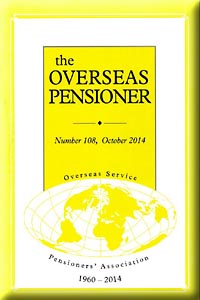 |
The Overseas Pensioner Journal
Published twice a year, this journal is produced by the The Overseas Service Pensioners' Association (OSPA). Most of OSPA's members lived and served in and around the British Empire. In addition to giving details about pension issues for its members, the journal also publishes book reviews, articles and reminiscences. Many of these articles have been made available online here |
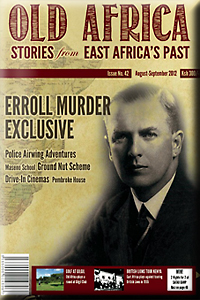 |
Old Africa Magazine: Stories from East Africa's Past
A full review of this magazine dedicated to East African history by Veronica Bellers can be read here |
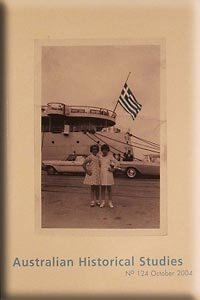 |
Australian Historical Studies
Published since 1940, this journal looks at the entire stretch of Australian History. Naturally it focusses on the European experience, but the aboriginal experience is also well represented. It used to be known as Historical Studies: Australia and New Zealand up until 1967. You can read the abstracts and see a free sample at the website. |
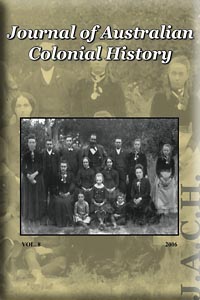 |
Journal of Australian Colonial History
Published since 1999, this journal focuses on the colonial period of Australian History. It is published by the University of New England. You can read the abstracts and full length book reviews at the website. |
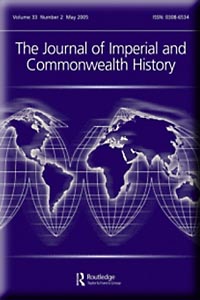 |
The Journal of Imperial and Commonwealth History
Routledge has been publishing this heavyweight academic journal since 1973. It will keep you abreast of all the most recent developments in imperial studies and history. You can sometimes find them on ebay. You can download a sample copy and see abstracts for all the magazines here |
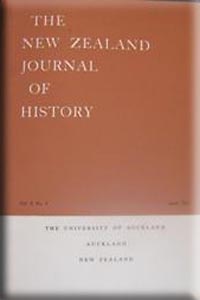 |
New Zealand Journal of History
Published since 1967, This journal inevitably looks at the imperial experience in New Zealand but also can look at the experience in the Southern Pacific in general. You can read the abstracts on the University of Auckland website. They can occasionally be found on ebay |
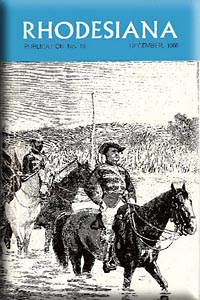 |
Rhodesiana
From 1956 until 1979 the Rhodesian Historical Society published this remarkably well written journal. It doesn't just cover the old Southern Rhodesia but really the entire Central African region. Primacy is certainly accorded to the European experience but there is still much to be gleaned from these pages. What is most remarkable is that they are all being made available to download by Richard Allport online for free in pdf form here. The can occasionally be found in their original form on ebay |
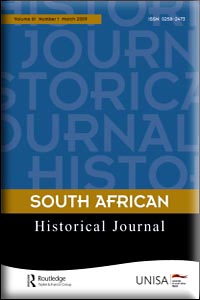 |
South African Historical Journal
Published since 1969, this journal looks at the imperial period - although quite a few articles are post 1948. You can read the abstracts and see a free sample at the website. |
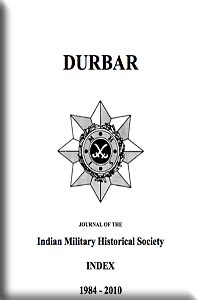 |
Durbar
Durbar is the Journal of the Indian Military Historical Society and covers the period of the British Indian Army to a considerable depth. It is published four times a year and is sent to members of the Indian Military Historical Society. You can join online at the IMHS Website |
| Books for Children |
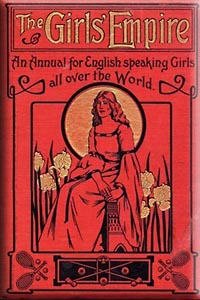 |
The Girls' Empire: An Annual for English-speaking Girls All Over the World
Written in 1903, this book was written to try and enthuse girls to become more active and helpful in building up a worthwhile empire. It is full of interesting bits of advice and activities for adventurous girls to undertake.

|
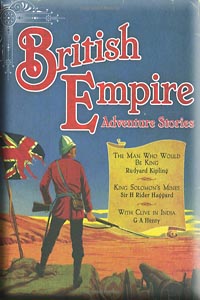 |
British Empire Adventure Stories: Three Stirring Tales of Heroism from the Age of Empire
Kipling, Henty and Rider Haggard were all wildly popular writers of imperial stories for boys of all ages. This book has three examples of their work in a very nicely designed book: King Solomon's Mines, The Man who would be King, With Clive in India
You can get the collected works of Henty, Kipling, Talbot Mundy and Rider Haggard as Kindle downloads. and Rider Haggard as Kindle downloads.

|
| Audio |
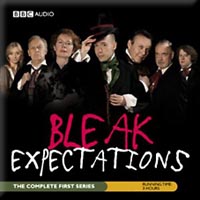 |
Bleak Expectations
This is a wonderful series broadcast by the Imperial Broadcasting Service (aka the BBC). It makes fun of all the Nineteenth Century literary genres in a very witty manner. Suitably imperial in tone, they are laugh out loud funny!
Series 1: 
Series 2: 
Series 3: 
Series 4: 
Series 5: 
|
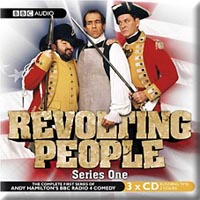 |
Revolting People
This is a series set during the American Revolution where it illustrates the tensions between revolutionaries, loyalists and soldiers as they are forced to coexist thanks to the forceful billeting of British soldiers on unwilling colonists. There are actually 4 series in total but I cannot find any mention of Series 3 or 4 being available.
Series 1: 
Series 2: 
|
| The Nigeria Magazine PDFs |
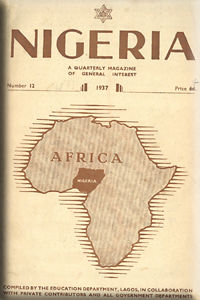 |
Nigeria Magazine, 1937
This magazine was published by the Education Department in Nigeria with contributions from other government departments. It was concerned with all sorts of educational, geographical and cultural aspects of life in the colony of Nigeria. |
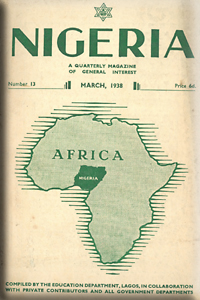 |
Nigeria Magazine, 1938 Q1
This magazine was published by the Education Department in Nigeria with contributions from other government departments. It was concerned with all sorts of educational, geographical and cultural aspects of life in the colony of Nigeria. |
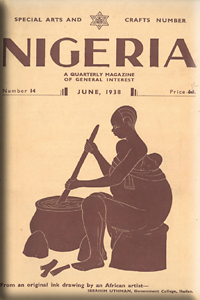 |
Nigeria Magazine, 1938 Q2
This magazine was published by the Education Department in Nigeria with contributions from other government departments. It was concerned with all sorts of educational, geographical and cultural aspects of life in the colony of Nigeria. |
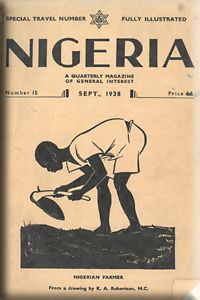 |
Nigeria Magazine, 1938 Q3
This magazine was published by the Education Department in Nigeria with contributions from other government departments. It was concerned with all sorts of educational, geographical and cultural aspects of life in the colony of Nigeria. |
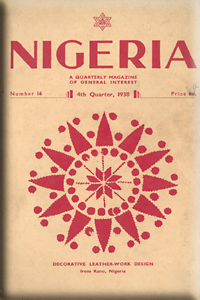 |
Nigeria Magazine, 1938 Q4
This magazine was published by the Education Department in Nigeria with contributions from other government departments. It was concerned with all sorts of educational, geographical and cultural aspects of life in the colony of Nigeria. |
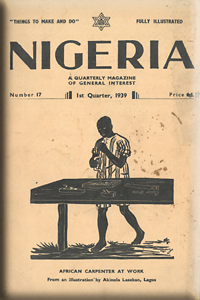 |
Nigeria Magazine, 1939 Q1
This magazine was published by the Education Department in Nigeria with contributions from other government departments. It was concerned with all sorts of educational, geographical and cultural aspects of life in the colony of Nigeria. |
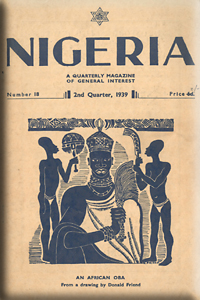 |
Nigeria Magazine, 1939 Q2
This magazine was published by the Education Department in Nigeria with contributions from other government departments. It was concerned with all sorts of educational, geographical and cultural aspects of life in the colony of Nigeria. |
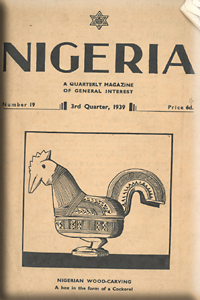 |
Nigeria Magazine, 1939 Q3
This magazine was published by the Education Department in Nigeria with contributions from other government departments. It was concerned with all sorts of educational, geographical and cultural aspects of life in the colony of Nigeria. |
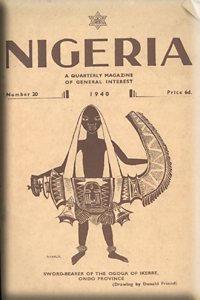 |
Nigeria Magazine, 1940 Q1
This magazine was published by the Education Department in Nigeria with contributions from other government departments. It was concerned with all sorts of educational, geographical and cultural aspects of life in the colony of Nigeria. |
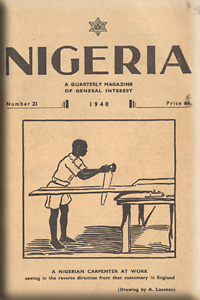 |
Nigeria Magazine, 1940 Q2
This magazine was published by the Education Department in Nigeria with contributions from other government departments. It was concerned with all sorts of educational, geographical and cultural aspects of life in the colony of Nigeria. This was to be the last of the magazines for a while due to the war. |
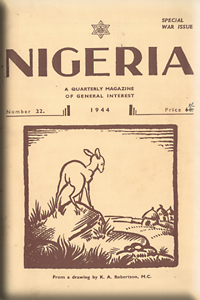 |
Nigeria Magazine, 1944
This magazine was published by the Education Department in Nigeria with contributions from other government departments. It was concerned with all sorts of educational, geographical and cultural aspects of life in the colony of Nigeria. |
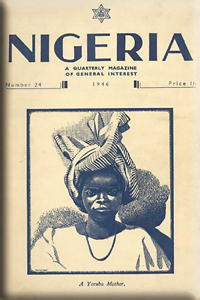 |
Nigeria Magazine, 1946 Q1
This magazine was published by the Education Department in Nigeria with contributions from other government departments. It was concerned with all sorts of educational, geographical and cultural aspects of life in the colony of Nigeria. |
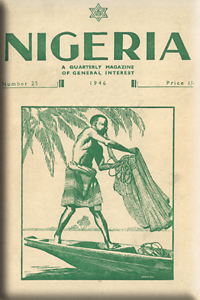 |
Nigeria Magazine, 1946 Q2
This magazine was published by the Education Department in Nigeria with contributions from other government departments. It was concerned with all sorts of educational, geographical and cultural aspects of life in the colony of Nigeria. |
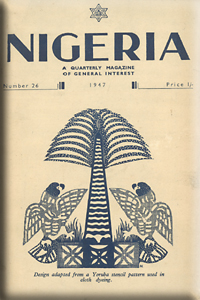 |
Nigeria Magazine, 1947
This magazine was published by the Education Department in Nigeria with contributions from other government departments. It was concerned with all sorts of educational, geographical and cultural aspects of life in the colony of Nigeria. |
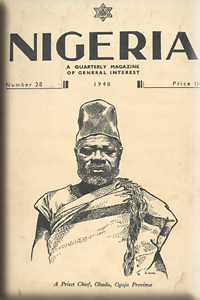 |
Nigeria Magazine, 1948 Q1
This magazine was published by the Education Department in Nigeria with contributions from other government departments. It was concerned with all sorts of educational, geographical and cultural aspects of life in the colony of Nigeria. |
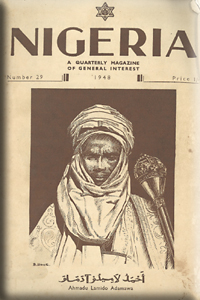 |
Nigeria Magazine, 1948 Q2
This magazine was published by the Education Department in Nigeria with contributions from other government departments. It was concerned with all sorts of educational, geographical and cultural aspects of life in the colony of Nigeria. |
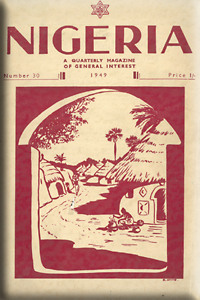 |
Nigeria Magazine, 1949
This magazine was published by the Education Department in Nigeria with contributions from other government departments. It was concerned with all sorts of educational, geographical and cultural aspects of life in the colony of Nigeria. |
| British and Colonial PDF Books available for Download |
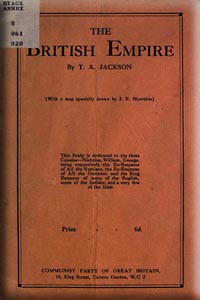 |
The British Empire
This was a tract written by T. A. Jackson of the British Communist Party in 1921. This Marxist interpretation is obviously hostile to the idea of Imperialism and looks forward to the day that the various imperial working classes unite as one. Notwithstanding class solidarity, it still sounds very condenscending to what the book refers to as 'coloured peoples of the Empire'. |
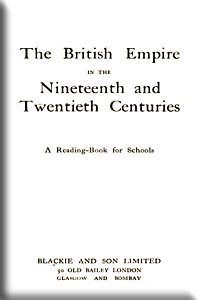 |
The British Empire in the Nineteenth and Twentieth Century
This was a textbook issued in the inter-war years to students in Britain and around the Empire. It is obviously hagiographic about the Empire with an almost 'manifest destiny' idea of Imperialism. It ranges from the Napoleonic Wars to the end of the Great War. |
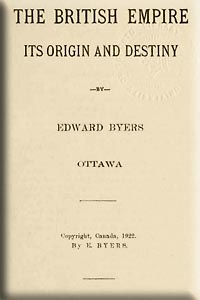 |
The British Empire: Its origins and Destiny
A 1922 book from Canada. A pro-imperial tract originally taken from the Toronto Sentinel. This book is surprisingly religious in tone as it sought to find a biblican precedent for a Christian Empire - perhaps somewhat apposite given the Canadian experiences just a few years earlier during the Great War. |
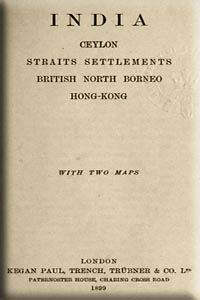 |
British Empire Series: Volume 1
This is an 1899 pro-imperial overview of The British Empire on a colony by colony basis. Many of the contributors were administrators or eminent pro-imperialists themselves. It was taken from a series of lectures given at the apogee of Imperial ambition - between Queen Victoria's Diamond Jubilee of 1897 and the setbacks of the Boer War. It was divided into five volumes. This volume discusses India, the Straits Settlements (Malaya), British North Borneo and Hong Kong. Read a contemporary book review |
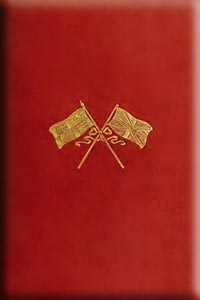 |
British Empire Series: Volume 4
This is the fourth of the above British Empire Series (not sure where volumes 2 and 3 have got to?). This volume discusses Australasia including the Australian states, New Zealand, New Guinea and various Pacific Islands. Interestingly, it was written just before the Federation of Australia in 1901. |
 |
British Empire Series: Volume 5
This is the fifth of the above British Empire Series (not sure where volumes 2 and 3 have got to?). This volume fills in the odds'n'sods. It is an eclectic collection of the various island colonies scattered across the Atlantic and Mediterranean. It also has variety of articles on the communication systems, commodoties and political systems in operation across the Empire, plus much more besides. |
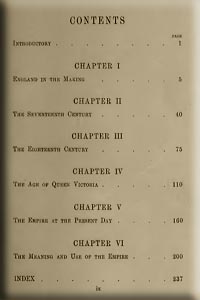 |
The British Empire: Six Lectures
Published in 1915 (at the height of the World War), this is a patriotic book designed to show why it was worth fighting for Britain and its illustrious Empire. It was something of a riposte to German criticisms and justification for the war in itself. The lectures cover the creation of the Empire and its development up to 1915. |
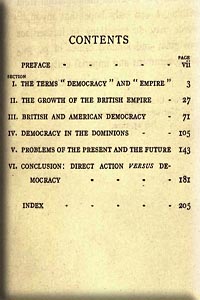 |
Democracy and The British Empire
Written in the immediate aftermath of the First World War, this book attempted to justify the enormous expansion of the Empire and justify its place as a possible Bulwark to the newly realised threat of Bolshevik Communism. In this cause it intellectually tried to tie the United States to British ideas of democracy before the US would withdraw into its period of isolationism. |
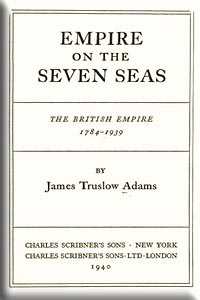 |
Empire on the Seven Seas
This was a book written in 1940 and published in America. It was designed to demonstrate to an American audience that the USA had far more in common with The British Empire than with the Fascist states of Germany and Italy currently engaged in war with Britain or even with Communist USSR who were still technically signatories of the Nazi-Soviet pact at this time. The book was designed to nudge US support towards the British. |
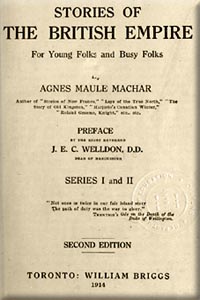 |
Stories of The British Empire
This book by Agnes Machar was compiled in 1914. It is really a collection of the important nation-building stages in British history and would have served as a text book to many. It has as many stories about Britain as it does the Empire, but it was all part of the glorification process to inspire young readers to service in the wider Empire and beyond. It would also be used to teach those growing up within the Empire, the history of the 'mother country' and her imperial expansion. |
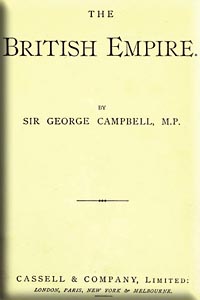 |
The British Empire
This is an interesting book from the 1880s that gives an overview of the forms of government of each of the colonies around the world. It is an analysis to provide some justification for more informal, federated style of Imperial government rather than an extension of British imposed government from the centre. The author, Sir George Campbell, was the MP for Kirkcaldy in Scotland but he was very widely travelled and even served as the Lieutenant Governor of Bengal in the 1870s. |
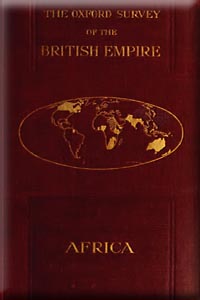 |
The Oxford Survey of The British Empire: Volume 3 - Africa
This is an overview of the continent of Africa written in 1914 - before the outbreak of the World War. It deliberately does not delve into the history of the various colonies, rather it examines their geography, peoples and economic overview and ambitions for the then future. It includes some interesting maps and plenty of facts and figures. |
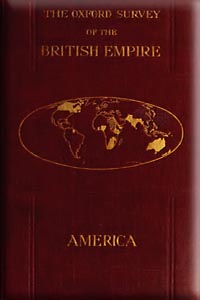 |
The Oxford Survey of The British Empire: Volume 4 - America
As its predecessor above, this book concentrates on the geography and economy of Canada (with the separate colony of Newfoundland), the various West Indies colonies and a small section on the Falkland Islands. |
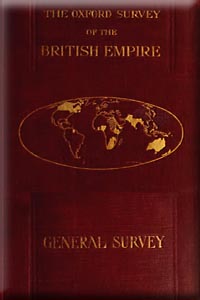 |
The Oxford Survey of The British Empire: Volume 6 - General Survey
This volume of the series discusses various administrative, practical and legal issues surrounding governing such a vast empire. It includes such sections as education, defence, health, communications etc... It is quite a practical overview of issues of governance and coordination over such vast distances. |
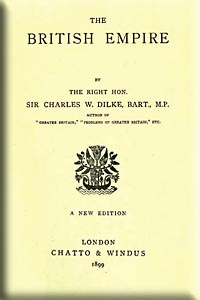 |
The British Empire
Written in 1899, Charles Dilke was a radical imperialist who thought that The British Empire was a force for good per se, but that within that empire, it should be a progressive agent of change to benefit the subject peoples. |
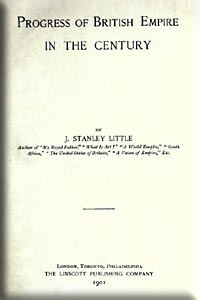 |
Progress of The British Empire
Written during the Boer War, this book by J. Stanley Little, was a remarkably prescient book that anticipated that the Great Power rivalry and jealousy of The British Empire might lead to the outbreak of a general conflagration. It is a little more sceptical of the benefits of imperialism compared to most of his contemporaries, but is still generally convinced of the civilising nature of the Empire. |
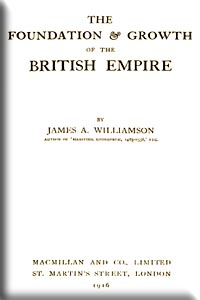 |
The Foundation and Growth of The British Empire
This was a text book written and published during the baptism of the First World War. It was written by James Williamson, it spans from the Tudor age to the outbreak of the war. Interestingly, it has some very nice maps to illustrate the growth of the empire over the years. |
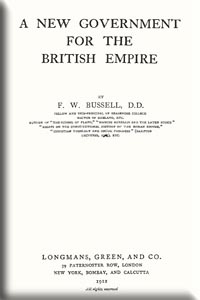 |
A New Government for The British Empire
This 1912 pamphlett by F.W.Bussell was an interesting attempt to give a rationale (and mechanisms) for a new Imperial government. It is interesting that the author was something of an authority on the Roman Empire - parallels that all good imperialists would have been keen to emulate and learn from. It basically wanted to recreate the House of Lords as an 'Imperial Senate' whilst devolving many powers to the individual colonies. It was a far different model from that one enacted at Westminster in 1931. |
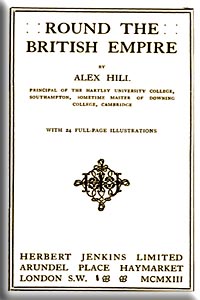 |
Round The British Empire
Written by Alex Hill, this was something of an educational travelogue to illuminate the scope and scale of The British Empire. It is supposed to teach some geography and history and introduce the reader to the positive aspects of the Imperial adventure. |
